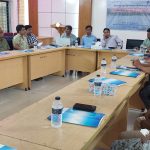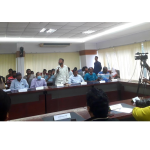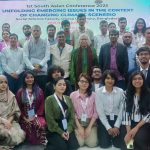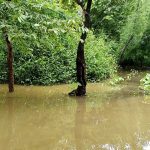The effects of climate change, such as cyclones, storm surges, sea waves, tidal surges, tidal flooding, sea level rise, and increased storminess, pose growing threats to marine ecology and biodiversity. According to the IPCC’s Sixth Assessment Report, the climate of South Asia is altering, and its effects are already being felt. Bangladesh, a country with a large coastline, is significantly impacted by saltwater intrusion. Hilsa is primarily a deep-sea fish that inhabits salty water. It migrates to freshwater for reproduction. However, the migration of Hilsa fish can be attributed to an increase in salinity and river water pollution. According to the Soil Resources Development Institute (SRDI), due to the rise in sea level, the salinity of coastal regions is increasing, which harms the reproduction of marine species. There is a strong correlation between salinity, temperature, and conductivity that affects water quality and the solubility of dissolved oxygen in water, which are related to fish migration. Muhammad Abdur Rahaman, Director of the Center for People and Environ (CPE) said Hilsa eggs hatch after 23 to 26 hours at an average temperature of 23°C in In freshwater rivers. To hatch Hilsa, it needs Salinity <0.1 ppt, PH 7.70-8.30, DO 5.0-6.8. But due to sea level rise and rising temperature in the sea surface, river surface temperature, and salinity increased. He also added that water pollution has changed DO, and PH in the river and seawater. As a result, the Hilsa egg hatch is decreasing which is responsible for declining Hilsa production.
In the capital city (Dhaka), a national dialogue was organized by Bangladesh Environment Movement (BAPA), Waterkeepr, and Sundarban Rokkha Andolon on 17 May 2023 at National Press Club on “Coastal Hilsa and Fishermen”. In the dialogue, Mr. Mir Mohammad Ali, Associate Professor of the Aquaculture Department of Sher-E-Bangla Agriculture University presented a concept note. Mr. Ali said, in the Bay of Bengal, the fishing restriction period is not similar in Bangladesh and India which is responsible for low fish catching in the coastal rivers of Bangladesh. Mr. Ali also added that Bangladesh is the source of over 80% of the world’s total production of Hilsa. But the Climate and Environmental changes have endangered both the lives of fishermen and the fishing industry.
Hilsa, Bangladesh’s national fish, embodies the country’s character in many ways. 20-25 lakh individuals are involved with hilsa resources directly and indirectly, resulting in about 7 lakh people’s engagement in the country. Hilsa has a remarkable contribution to our national economy and more than 1% of the GDP comes from Hilsa.

The experts say the migratory routes and reproductive grounds of the Hilsa are disrupted, displaced, or even destroyed as a result of various anthropogenic activities, climate change effects, increased siltation, and rising river basins. Hilsa fish are migrating from rivers to deep sea regions as a result of pollution, and the increased movement of trawlers and other water vessels is also contributing to the Hilsa shortage. The fishermen participants of the dialogue mentioned that though vast quantities of Hilsa are being captured in the deep sea, insufficient Hilsa in rivers for fishermen to catch. Major Hilsa to catch has progressively migrated from freshwater to saltwater. Hilsa is difficult to catch for fishermen with tiny boats and inadequate gear. Mr. Md. Ataur Rahman, a fisherman from Kalapara upazila of Patuakhali who was fishing in the Ramnabad channel for the last 18 years, stated that he can still recall the first time he caught enormous Hilsa fish in the channel, however, he cannot catch Hilsa in this channel and nearby rivers for the last 4–5 years. When recounting the events of his life as a sailor, Mr. Abdus Sattar, a fisherman from Taltali, Barguna, stated, “I have been fishing in the deep sea for the previous 30-35 years. In my Trawler, 18–20 people used to work to earn their living. However, 8–10 individuals are now working to cut back on fishing. The rivers are no longer full of fish as it once was. Fishing in the deep sea is more expensive”.
Women in Mongla engage in fishing with their spouses in addition to male fishermen. In the Pasur River, Chandrika Mondal spent 10 years fishing with her husband. She said there is no sufficient Hilsa in the Pasur River though there were abundant Hilsa a couple of years ago. She also said that the majority of fishermen gave up fishing and started working as day laborers. The thought of Mr. Abdur Rashid Hawladar, a fisherman from the Bagerhat district, water pollution and waste from nearby mills, dirty oil from ships, and coal is responsible for destroying Hilsa fish in the Pasur River.
In the dialogue, S.M Shahzada, Honorable Member of Parliament Patuakhali along with other policymakers urged the importance of Hilsa for the national economy.
Professor Md. Abdul Wahab, Bangladesh Agricultural University said, everyone seems to have forgotten that there is no Hilsa in the Andharmanik River. We have a law that fishing boats are not allowed to fish within 40 meters coastline but most of the fishing boats don’t obey this law. So government should take proper initiative in the implementation of this law. Professor Dr. Syed Ali Azhar, a fisheries researcher, emphasized the importance of ensuring fishermen’s insurance, citing the vulnerability of fishermen to various natural calamities, robberies, and security.
- Sultana Kamal, President of Bangladesh Environment Movement (BAPA) said, “We must coordinate with India for a similar ban period of fishing in the Bay of Bengal.” She also urges the importance of cultural development along with infrastructural development for the national interest.
In this dialogue, Mr. Md. Akhtaruzzaman MP, Honorable Member of Parliament, Khulna 6, Prof. Gulshan Ara Latifa, Department of Zoology, University of Dhaka, Prof. Dr. Md. Shahidul Islam, Chairman, Department of Geography and Environmental Studies, University of Dhaka, Masuda Ara Momi, Deputy Director, Directorate of Fisheries (Hilsa Management Branch) also delivered their valuable speech.












